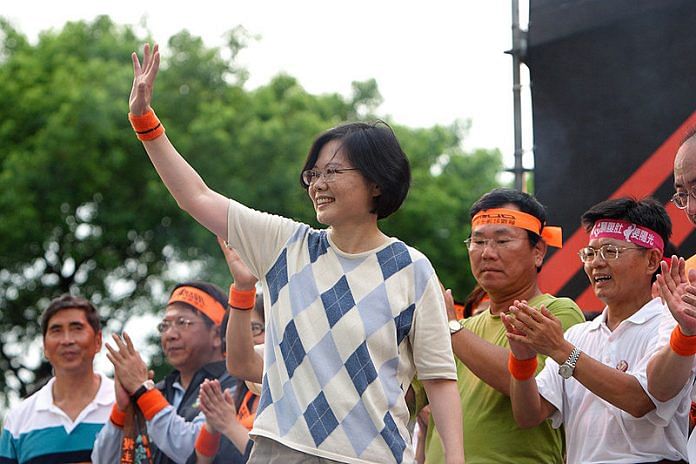Taiwan is trying to push investments in semiconductor technology and mobile payments sector in India, says deputy minister Cheng-Mount Cheng.
Taipei: Amid escalating tensions with China, Taiwan is actively focusing on India for trade and investments to reduce its economic dependence on its western neighbour, a Taiwanese deputy minister has said.
The move is part of Taiwan’s New Southbound Policy, which Taiwanese President Tsai Ing-wen launched after she took charge in May 2016, and is aimed at fostering links with countries in South Asia, South East Asia, Australia and New Zealand.
Cheng-Mount Cheng, deputy minister at National Development Council, Taiwan’s planning agency, said India is among the fastest growing economies in the world and Taiwan hopes to make forays in the semiconductor technology and the mobile payments sector in India.
“We are trying very aggressively to develop economic ties with India. It is a very fast-growing economy with a growth rate that is at the top of the world, almost 7 per cent,” Cheng told ThePrint during an interaction with a group of international journalists in Taipei earlier this week.
“Taiwan is trying to push investments in semiconductor technology in India. We are also looking at mobile payments. We share common interests with India,” he added.
Also read: India’s loss in the Maldives is China’s gain, and it is showing
A number of major Taiwanese firms such as Foxconn and Asus are looking to establish bases in India, Cheng said.
“All this helps diversification, away from China. We meet at the India office in Taipei very often. So, I believe that India will become an important economic partner for Taiwan,” he said.
Foxconn, the trade name for Hon Hai Precision Industry Co. Ltd, is the world’s largest contract electronics manufacturer, which had signed an agreement with the Maharashtra government in 2015, saying it would invest $5 billion in the state and help create 50,000 jobs by 2020. The investment, however, is yet to take shape.
Taiwan’s current trade with India and China
In 2017, China accounted for $139 billion of Taiwan’s total trade, or about 24 per cent, followed by the United States and Japan at 11.6 and 10.8 per cent respectively, according to data available with Taiwan’s Bureau of Foreign Trade.
India was 16th on the list, accounting for $6.3 billion, or about 1 per cent of Taiwan’s total trade.
China also comprised 28 per cent of Taiwan’s exports at $88.9 billion, while India, with $3.3 billion comprised just about 1 per cent.
Although China remains Taiwan’s number one trade partner, the region’s trade with India has also grown since then. In the first seven months of this year, Taiwanese exports to India were at $2.28 billion, an increase of 23.52 per cent over the same period last year.
India-Taiwan relations
India and Taiwan do not have formal diplomatic ties and share bilateral relations through the India Taipei Association. Taiwan also operates the Taipei Economic and Cultural Centre in Delhi.
China considers Taiwan as its breakaway province and insists on a one-China policy although Taiwan is governed by a separate administration and has its own president.
However, India and Taiwan have been warming up to each other since Taiwanese President Tsai took over the reins.
Last year, the India Taipei Association and the Taipei Economic and Cultural Centre signed a memorandum of understanding to promote industrial and technical cooperation.
Since May 2016, India and Taiwan have signed at least four more bilateral agreements for cooperation on air services, mountain railway heritage, agriculture, besides an ‘Authorised Economic Operators Recognition Action Plan’.
Earlier this year, Taiwan also established a centre to promote its regional economy, trade and cultural exchanges in India, along with six other Asian countries.
What is ‘Southbound Policy’?
In her ‘National Day’ address in Taipei Wednesday, President Tsai spoke about how China has challenged the status quo of peace and stability in the Taiwan Strait, and why Taiwan needs to maintain stability and calmly find its survival niche.
Also read: Only India and China can help emerging markets rebound
Taiwan does not want to escalate confrontation, and will counter Chinese aggression by strengthening its national security, economy and social safety net, she said.
“We need to create key industry chains that support economic development and people’s livelihoods and well-being through diversified cooperation with New Southbound countries and other emerging markets that have development potential,” Tsai said.
Taiwan must establish close industrial, labour and technical links with Europe, Japan and the United States in research and development and cutting-edge manufacturing, she added.
(The reporter is in Taipei at the invitation of the Taiwanese government.)



